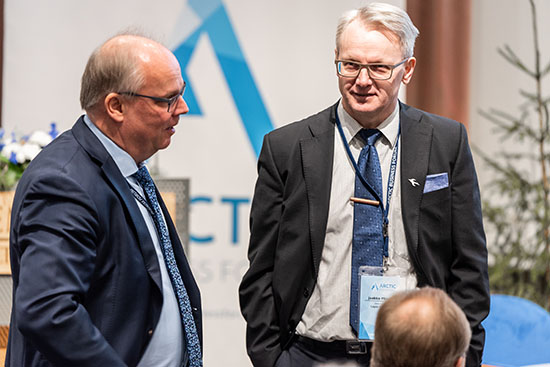Timo Rautajoki, the president and CEO of Lapland Chamber of Commerce wants the North to fend for itself in global business, and prosper in a responsible way.
“When we launched the Arctic Business Forum in 2010, the business opportunities of the Arctic region were just emerging. Our focus was on the parts of the Arctic that we live in, on what we used to call the European High North. The companies in Lapland wanted to learn what was going on in the region”, Timo Rautajoki recalls.
“At the time – just like today – there were major investment plans brewing. We presented those opportunities for the local actors. The business landscape has changed since. Progress has not been quite as fast as we predicted, and in hindsight, this was fortunate.”
The head of Lapland Chamber of Commerce participates actively in the regional business debate.
“During the Business Forum we will talk about logistics, about what is going on with the Northeast Passage, and I am certain that the Arctic railway project will also come up.”
For Timo Rautajoki, responsible growth in the Arctic means that we admit and assume the implications of climate change.
“By now, I think we all have understood what it signifies in the Arctic region. Slowing down global warming is essential. That requires us to cut down emissions, replace fossil fuels with renewable energy and reduce our carbon footprint. Climate change will be an important topic in our forum.”
In recent months, carbon sinks and the responsible use of forests have been a major theme on the political scene in Finland.
“We cannot carry out all the investments that are currently being planned. We must discuss and decide how we will best invest and prosper”, Timo Rautajoki says.
“The major investments planned by our northern neighbour Norway are all oil-related. Oil and gas in the Barents Sea, and this has made the northern parts the most important investment region in the country. From the point of view of Lapland, this is not exactly sustainable.”
“In the European High North, we are undergoing a shift. We need to consider what we need to invest and what to invest in”, Timo Rautajoki urges.
Tourism is a major industry in Lapland, and sustainability is a big issue there.
“Tourism has to be responsible. We are dependent on air travel, and we need to find ways to lessen its impacts on the environment. In Finland, the rail passenger traffic should be improved in such a way that we could get tourists from Europe all the way up here. In Sweden, there is already talk of European night trains. Their rail network could be an answer to our needs as well.”
Timo Rautajoki reminds that the major Arctic themes, such as black carbon, often bring major business opportunities. However, in order to benefit, the companies need to know when and where decisions are made.
“I am a bit worried that now that Finland’s successful chairmanship in the Arctic Council is over, the Arctic will no longer remain on the agenda. The government should continue to devote efforts and resources in our region. The Arctic policies need continuity, and we need up-to-date information on Arctic plans and projects”, he emphasises.
“In Lapland, we have been doing business for over a hundred years. We are a part of the global economy. We can continue to flourish by building on our own resources and assets.”
The two-day Arctic Business Forum will discuss northern economic development, investment schedules and business opportunities. Keynote speakers are Jari Vilén, Senior Advisor in Arctic policy matters in the European Political Strategy Centre EPSC, Jan Dusik, Principal Adviser for Strategic Engagement for the Arctic and Antarctic at UN Environment and Kjell Stokvik, Managing Director at the Center of High North Logistics in Norway.
The Arctic Economic Council has its Annual Meeting in Rovaniemi this week. The Council will publish reports on shipping and on mining in the Arctic region. The AEC Working Groups on Communications, Energy, Investment and Infrastructure will present the preliminary results of their work. At the Arctic Business Forum, AEC Chairman Tero Vauraste will give a summary of the Finnish businesses chairmanship in the Arctic Economic Council.
In the sessions, the participants will discuss maritime transportation, infrastructures and connectivity, responsible use of natural resources, tourism, Arctic start-ups and Arctic business information. As in any successful meeting, building personal networks is a key element in the program.
Photos top of page Timo Rautajoki, bottom of page discussions during the previous Forum. Both photos © Arctic Business Forum/Jouni Teittinen
